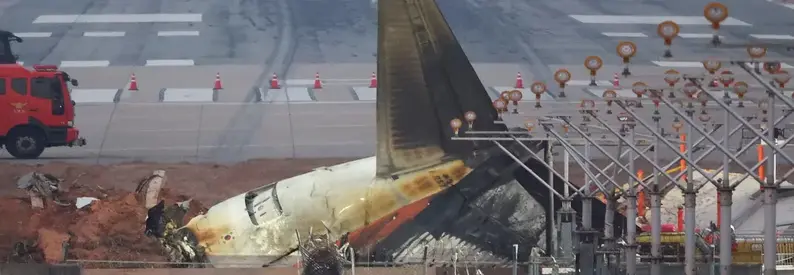Boeing Shares Fall After South Korea Orders 737-800 Inspections

Boeing shares fell by more than 2% on Monday after South Korea ordered an inspection of all 737-800 planes operated by domestic carriers following a deadly Jeju Air crash over the weekend. The crash, which occurred at Muan International Airport, resulted in 179 fatalities, with only two survivors.
South Korea’s Acting President, Choi Sang-mok, instructed the Ministry of Land, Infrastructure, and Transport (MOLIT) to carry out an emergency safety inspection of the country’s airline operations. The investigation is focusing on the Boeing 737-800, which was involved in the fatal crash. Officials from MOLIT confirmed that the pilot had reported a bird strike shortly before the crash, with the aircraft attempting an aborted landing and declaring a mayday.
The crash occurred when the plane’s landing gear failed to deploy, causing the aircraft to skid off the runway, crash into a concrete wall, and burst into flames. Two black boxes have been retrieved from the wreckage and are being analyzed. The U.S. National Transportation Safety Board (NTSB), the Federal Aviation Administration (FAA), and Boeing are all participating in the investigation.
While the exact cause of the crash remains uncertain, MOLIT officials are also inspecting the wall the aircraft collided with and reviewing the aircraft’s maintenance records. The Boeing 737-800, one of the most widely used models in commercial aviation, has a strong safety record, with over 4,400 units in service globally.
Jeju Air, the largest operator of the 737-800 in South Korea with 39 jets, denied that mechanical faults or safety issues contributed to the crash. The airline has emphasized its commitment to aircraft maintenance and insurance coverage for the victims, which amounts to $1 billion. On Monday, another Jeju Air 737-800 flight returned to Gimpo International Airport after a landing gear issue was detected shortly after takeoff.
The crash has raised concerns about the safety of the 737-800 model, which is widely used by South Korean low-cost carriers such as T’way Air, Jin Air, Eastar Jet, and Air Incheon. Despite these concerns, aviation experts have suggested that a design flaw is unlikely to have played a role in the incident, given the aircraft’s solid safety record.
Shares of Jeju Air plunged by 8.65% on Monday, reaching an all-time low, as the airline and Boeing continue to face scrutiny following the crash.
Related News : https://suspicious-zhukovsky.67-21-117-18.plesk.page/?s=South+Korea+Airlines
Sources: AirGuide Business airguide.info, bing.com, cnbc.com
